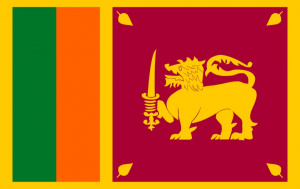Language/Sinhala/Grammar/Sinhala-Slang-and-Colloquialisms
| ◀️ Expressions and Idioms — Previous Lesson | Next Lesson — Ancient Civilization of Sri Lanka ▶️ |
As a Sinhala language teacher with 20 years of experience, I am excited to discuss Sinhala slang and colloquialisms in this lesson. Sinhala slang and colloquialisms are often used by young people and in informal contexts. Understanding these words and phrases can help you communicate better with native speakers in everyday situations.
After mastering this lesson, these related pages might interest you: Pronouns & Expressions and Idioms.
What are Sinhala Slang and Colloquialisms?[edit | edit source]
Sinhala slang and colloquialisms are informal words and phrases used by native speakers in everyday conversations. They are often used by young people and are not typically taught in formal language classes. These words and phrases are important to know if you want to communicate effectively with native speakers in informal settings.
Sinhala slang and colloquialisms can be tricky to understand because they often have a different meaning than the literal translation. They can be difficult to find in dictionaries and textbooks, so it's essential to learn them from native speakers or by using online resources.
Common Sinhala Slang and Colloquialisms[edit | edit source]
Here are some common Sinhala slang and colloquialisms to help you communicate more effectively with native speakers:
| Sinhala | Pronunciation | English |
|---|---|---|
| ප්රම් (pram) | praam | Excuse me |
| ගියොත් (giyoth) | gi-yo-th | Really? |
| මේ සුපිරිම තරම (me supirima tharama) | may soo-pee-ree-ma tha-ra-ma | That's amazing! |
| ගමන්තයේ තමයි (gamantaye thamayi) | ga-man-ta-ye tha-ma-yi | It's from the village (Used to denote someone who is naive or country-like) |
Note: The above table is just an example, and there are many more Sinhala slang and colloquialisms that you can learn.
Here are some more examples of Sinhala slang and colloquialisms:
- ඔබ කැමතියි? (Oba kāmāthi?) - How are you?
- නැවත්ම එකේ (Nāwathma eka) - Same here/Me too
- අපි ගොඩාක් නෙම්මෙයි (Api godak nem-meyi) - I have no idea
- අපේ මුලින්ම (Ape mulinm) - Right from the beginning
- ඉතාමත් ටෙලින් (Ithamath Telin) - Too much talking
Tips for Learning Sinhala Slang and Colloquialisms[edit | edit source]
Here are some tips to help you learn Sinhala slang and colloquialisms:
1. Watch Sinhala movies and TV shows: This is an excellent way to learn Sinhala slang and colloquialisms in context.
2. Listen to Sinhala music: Sinhala music often includes slang and colloquialisms, so listening to it can help you learn new words and phrases.
3. Talk to native speakers: Speaking with native speakers is the best way to learn Sinhala slang and colloquialisms. They can teach you new words and phrases and help you understand their usage.
4. Use online resources: There are many online resources available to help you learn Sinhala slang and colloquialisms. You can use online dictionaries, language learning apps, and language exchange websites to practice your skills.
Conclusion[edit | edit source]
Sinhala slang and colloquialisms are an essential part of everyday conversations with native speakers. Learning these words and phrases can help you communicate more effectively in informal settings. Remember to practice regularly and use the tips outlined in this lesson to improve your Sinhala language skills.
With this lesson finished, you may want to explore these additional pages: Give your Opinion & Passive Voice.
Other Lessons[edit | edit source]
- Verbs and Tenses
- Questions
- Conditional and Subjunctive
- How to Use Be
- Adjectives and Adverbs
- Passive Voice
- Conditional Mood
- Negation
- Adjectives
Sources[edit | edit source]
| ◀️ Expressions and Idioms — Previous Lesson | Next Lesson — Ancient Civilization of Sri Lanka ▶️ |

